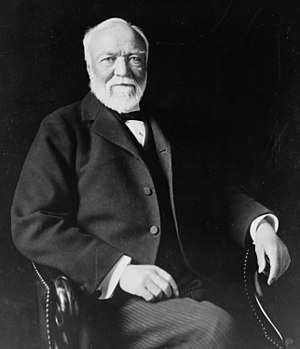Barbara Johnstone
Barbara Johnstone (born March 24, 1952) is an American professor of rhetoric and linguistics at Carnegie Mellon University. She specializes in discourse structure and function, sociolinguistics, rhetorical theory, and methods of text analysis.[1] She was the editor in chief of Language in Society from 2005 to 2013,[1] and is the editor of Pittsburgh Speech & Society, a website about Pittsburgh English for non-linguists.[2] She has published several books, including Speaking Pittsburghese (2013) and Discourse Analysis, 2nd Ed. (2008). She has also written for The New York Times.[3]
Barbara Johnstone | |
|---|---|
| Born | March 24, 1952 |
| Occupation | Professor, Carnegie Mellon University |
| Known for | Scholar of discourse studies |
Education
Johnstone received her bachelor of arts in linguistics from Yale University. She received her master's and her doctorate in linguistics at the University of Michigan.
Career
She taught at Indiana University – Purdue University Fort Wayne (1981-1985), Georgetown University (1985-1987), and Texas A&M University (1987-1997, followed by her current position of professor of rhetoric and linguistics at Carnegie Mellon University since 1997.[4]
Johnstone has also published papers on gender and language, Arabic language discourse, as well as many other linguistic topics.[5] On top of that, she also wrote a book called the "Linguistic Individual,"[6] discussing self-expression in language.
Research on Pittsburghese
Johnstone is recognized as an expert on Pittsburgh English,[7] locally known as "Pittsburghese." Her research is concerned with how the dialect is "constructed through local talk, and talk about talk," connecting "people's understandings of language and place" with language change.[1] Her 2013 book Speaking Pittsburghese: The Story of a Dialect, is a summation of her scholarly work on Pittsburgh English.[1][8][9] The book is a sociolinguistic analysis of the history of Pittsburgh English and how it has changed over time, with a focus on the process of enregisterment and how the dialect is linked to local identity.[10] It also explores the history and local use of some of Pittsburgh's most emblematic words, including "yinz," "nebby," and "dahntahn."[11] Johnstone also focuses on phonological features of "pittsburghese" such as the monophthongal /aw/.[12]
Research on Texas women
Johnstone has written about style-shifting among Texas women. In her article, "Uses of southern-sounding speech by contemporary Texas women", Johnstone delves into how Texas women use different ways of talking, which range from "automatic and nonstrategic" to "very planned and strategic".[13]
In another article, titled "Sociolinguistic Resources, Individual Identities, and Public Speech Styles of Texas Women", Johnstone studied how women in Texas form linguistic identities based on their own individual backgrounds, such as ethnicity, region of living, as well as the linguistic models they experienced in their lives.[14]
References
- "Barbara Johnstone Carnegie Mellon University". Carnegie Mellon University.
- "Pittsburgh Speech & Society". University Library System at University of Pittsburgh.
- Johnstone, Barbara (December 23, 2013). "Local Accents Give You a Sense of Place". The New York Times.
- "Selected Works of Barbara Johnstone". bepress. Retrieved 4 March 2018.
- "Barbara Johnstone | Carnegie Mellon University | discourse structure and function, sociolinguistics | Professor of Rhetoric and Linguistics, Affiliated Faculty, Department of Modern Languages". works.bepress.com. Retrieved 2015-04-14.
- Johnstone, Barbara (2009). Jaffe, Alexandra (ed.). "Stance, Style, and the Linguistic Individual". Sociolinguistic Perspectives on Stance. Oxford University Press.
- Potter, Chris (January 22, 2014). "Oral History: CMU linguistics professor charts the city's history through its language". Pittsburgh City Paper.
- Rea, Shilo (November 4, 2013). "Pittsburghese: Carnegie Mellon's Barbara Johnstone Uncovers the Story of a Dialect". Carnegie Mellon University.
- Johnstone, Barbara (October 14, 2013). Speaking Pittsburghese: The Story of a Dialect. Oxford Studies in Sociolinguistics. Oxford University Press. pp. lxxi. ISBN 9780199374915.
- University, Carnegie. "Press Release: Pittsburghese: Carnegie Mellon's Barbara Johnstone Uncovers the Story of a Dialect-Carnegie Mellon News - Carnegie Mellon University". www.cmu.edu. Retrieved 2015-04-14.
- Weaver, Rachel (January 4, 2014). "Yinzers proud of their dialect n'at". Pittsburgh Tribune-Review. Retrieved 2014-03-22.
- Johnstone, Barbara; Kiesling, Scott (2008). "Indexicality and experience: Exploring the meanings of /aw/-monophthongization in Pittsburgh". Journal of Sociolinguistics. 12 (1): 5–33. doi:10.1111/j.1467-9841.2008.00351.x.
- Johnstone, B. (1999) Uses of southern-sounding speech by contemporary Texas women. Journal of Sociolinguistics, 4 (3), 505-22.
- Johnstone, Barbara (1995). "Sociolinguistic resources, individual identities, and public speech styles of Texas women". Journal of Linguistic Anthropology. 5 (2): 183–202. doi:10.1525/jlin.1995.5.2.183.
